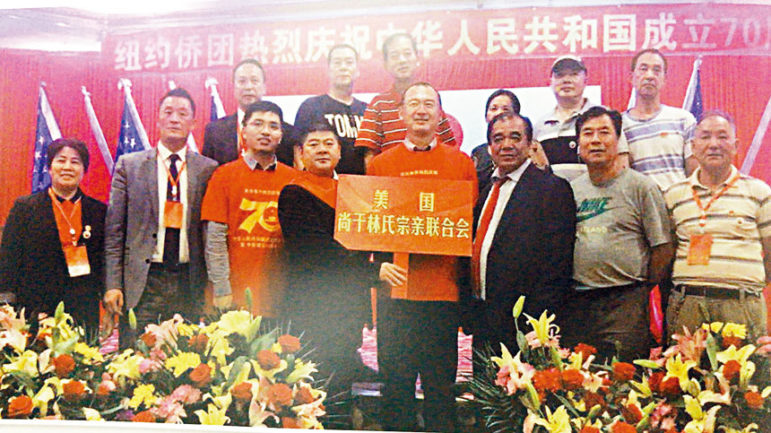
Courtesy Sing Tao Dail
Members of the Tao River Lin Family AssociationRead the original story in Chinese at Sing Tao Daily
Translated by Rong Xiaoqing
One of the groups hit hard in the coronavirus pandemic are Chinese immigrants from Fujian province, many of whom worked in takeout restaurants and other small businesses across the country but now face lost jobs, as well the lodging provided by their employers.
A New York-based township organization has jumped in to help, offering free meals and hotel rooms to immigrants from Fujian province who are struggling. Zheng Lin, president of the organization, said people from the same town consider one another family members, and he wants to tell his extended families that he believes the Chinese takeout industry will fully recover after the pandemic, and as long as they survive, they’d be able to find jobs again.
Immigrants from Fujian predominantly work at Chinese takeout restaurants outside of New York, which often provide free food and lodging to employees as an industry standard. Now as the restaurants close down, many workers become have homeless.
For many, their only option seemed to be coming back to their relatives and friends in New York. But that is not easy, as many of their contacts live in crammed rental apartments here in the city themselves. With the virus in mind, few roommates and landlords want to take in someone travelling from other states. As a result, many of the Chinese restaurant workers who came back to New York find themselves in a dire situation.
The Tao River Lin Family Association, a community organization for immigrants from the town Tao River in Fuzhou City in Fujian, has rented hotel rooms to provide for free to those in need. Lin also has his own restaurant in Sunset Park, which is delivering them with free meals.
So far, six people have asked and received help from the Association, and Lin said the organization doesn’t place a cap on the number of people it aims to help and services will last until those in need regain a steady foothold.
“If we run out of money, the members are willing to donate more,” said Lin. “People from Tao River are all warm-hearted. We are all from the same family.”
Tao River is a town under the Min Hou County of Fuzhou City. While the official name is Shang Gan, people call it Tao River because it is surrounded by the river. All people in this town share the last name Lin, and consider themselves offspring of a woman named Lady Fifth in the Song Dynasty (960–1279), who sacrificed her opportunity to get married to raise her orphaned nephew, the only male of the Lin family who survived a shipwreck. They believe the altruism in Lady Fifth has been passed on to them via their DNA.
Lin said that the association was formed in Feb. 2017 and has more than 1,000 members now. Earlier this year, when China had its own COVID-19 outbreak, the organization donated more than $43,000 and and protective medical equipment worh $50,000 to their home country.
“The pandemic hadn’t hit the U.S. yet at the time. But I thought if one day, immigrants in the U.S. need urgent help, it may take too long to raise money for them whenever they ask,” said Lin. “So I decided to setup a fund. Members can donate voluntarily whenever they like. And the money would be used to help immigrants from our town whenever they are in need.” The fund, launched in February, received $10,000 donation within two weeks.
Emigrating to the U.S. in July 2004, Lin followed the same path as many immigrants from Fuzhou: toiling at restaurants in the early days. Now he has his own eatery, which provides free food to fellow immigrants in need, though he asked the reporter to leave the name of his restaurant out of this story. “I just want to help people. I don’t want it to look like I was promoting my own restaurant,” Lin said.
Talking about the future of the takeout industry, Lin said that in many states other than New York, Chinese food is still the most nutritionally balanced food that people are able to get with low prices. Therefore, the market is still robust. He doesn’t believe that the industry is dying. “When the virus is gone, people still have to eat,” said Lin. “Chinese takeouts will quickly recover to the level before the pandemic. So people who lost jobs now don’t have to worry too much.”
But Lin said what he worries restaurants owners themselves would start a price war to grab the market, as has happened before. “If you increase the portion without raising the price or largely reduce the price, you’d start a vicious competition,” he said. “Eventually you’d drag down the whole industry.”









